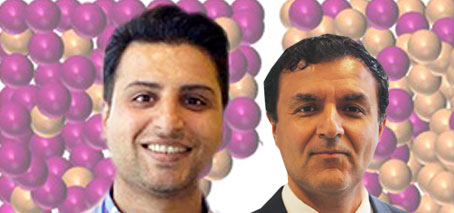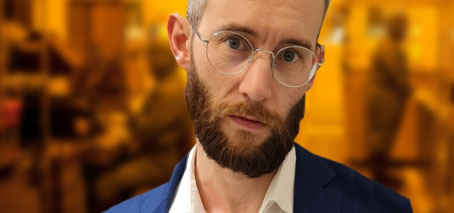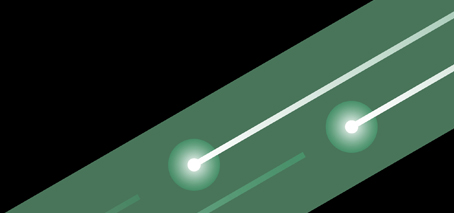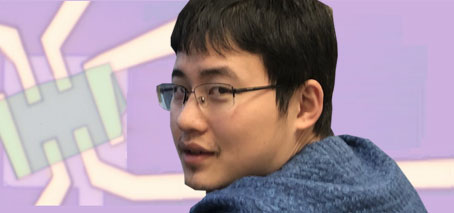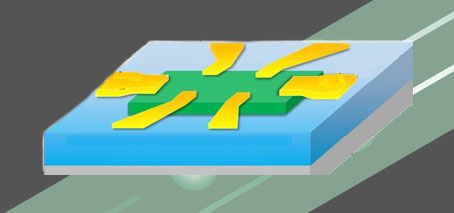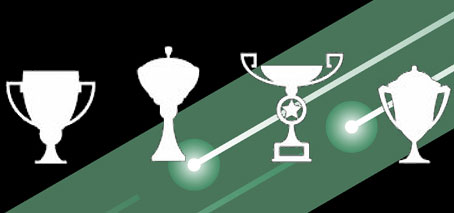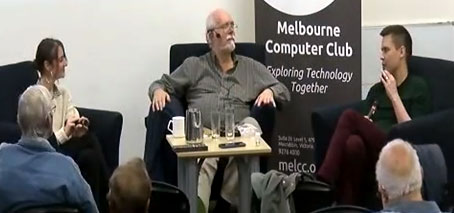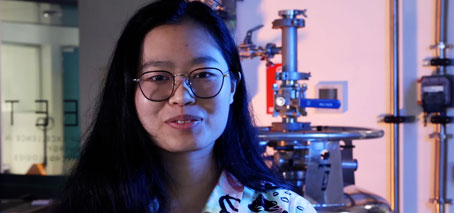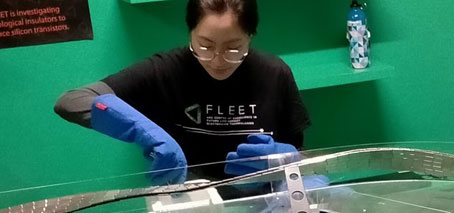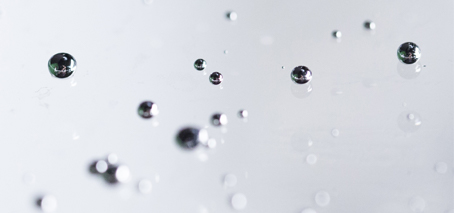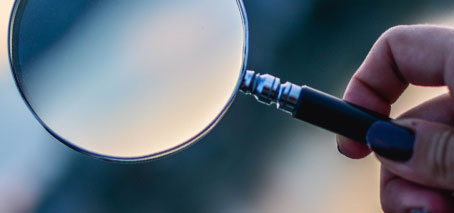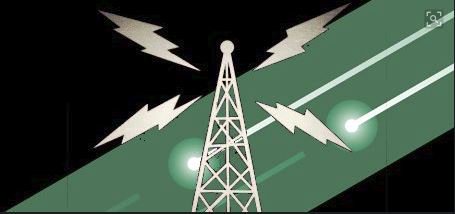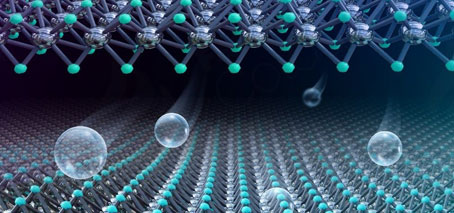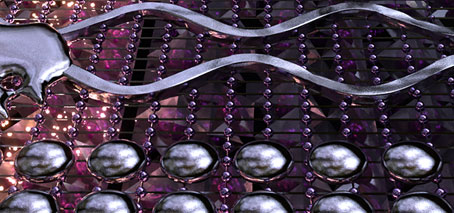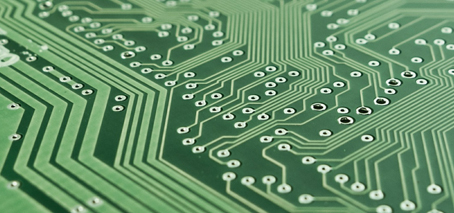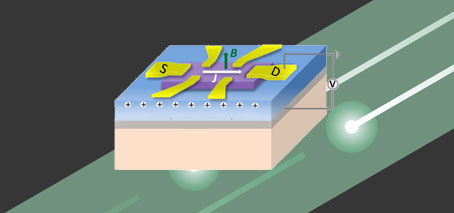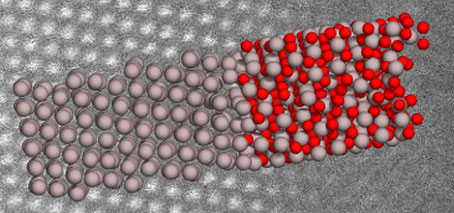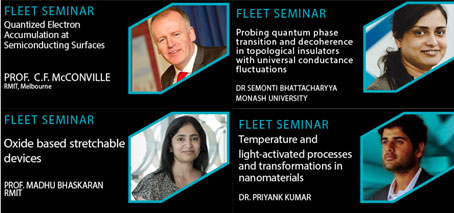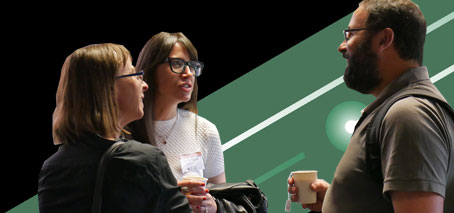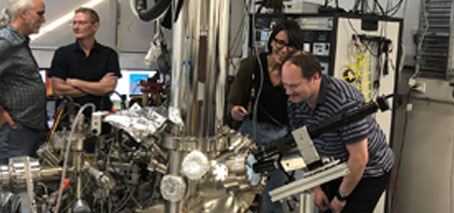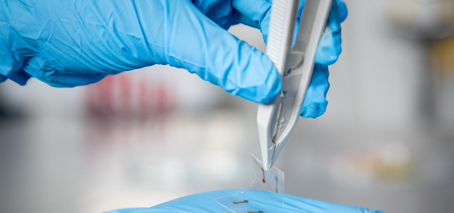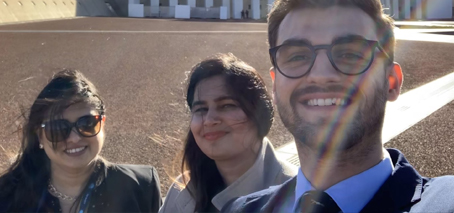Some alloys are in the liquid state at or near room temperature. These alloys are usually composed of gallium and indium (elements used in low energy lamps), tin and bismuth (materials used in constructions). The ratio and nature of elements in liquid alloys generate extraordinary phenomena on the surface of liquid metals which have been rarely explored to date and …
Where are they now? Life Post-FLEET with Paul Atkin
Talk to as many people as possible about your future career Stay open to new career directions Hi, I’m Paul Atkin. If we didn’t meet during my time as a FLEET scientist, we may have met more recently in my new life as a sales guy. If we haven’t met yet, I sincerely apologise and strongly suggest we meet for …
Congratulations Jemima and Tommy
Congratulations to Jemima Goodhew (UQ) – the newest Women in FLEET Honours scholar – and Tommy Bartolo (RMIT), who has received a FLEET writeup scholarship. Jemima Goodhew has been working with FLEET CI Prof Matt Davis at UQ on computationally modelling a 2D superfluid Helmholtz resonator, driven by a chemical potential difference. She is particularly interested in the transition to and …
Transforming the layered ferromagnet Fe5GeTe2 for future spintronics
Realizing in-situ magnetic phase transition in metallic van-der-Waals magnet Fe5GeTe2 via ultra-high charge doping A RMIT-led international collaboration published this week has achieved record-high electron doping in a layered ferromagnet, causing magnetic phase transition with significant promise for future electronics Control of magnetism (or spin directions) by electric voltage is vital for developing future, low-energy high-speed nano-electronic and spintronic devices, …
Inducing and tuning spin interactions in layered material by inserting iron atoms, protons
Controlling Dzyaloshinskii-Moriya interaction (DMI) in chiral magnet iron-doped tantalum-sulfide by proton intercalation Magnetic-spin interactions that allow spin-manipulation by electrical control allow potential applications in energy-efficient spintronic devices. An antisymmetric exchange known as Dzyaloshinskii-Moriya interactions (DMI) is vital to form various chiral spin textures, such as skyrmions, and permits their potential application in energy-efficient spintronic devices. Published this week, a Chinese-Australia …
Australian STEM recognised in Shanghai rankings
Great results for STEM in Australian universities in the Shanghai/ARWU 2021 rankings, with Australian universities represented in the world top-100 for all the natural sciences and engineering disciplines except maths. Highlights amongst FLEET’s participating nodes include: Monash and ANU (#28) ranked in the global top 100 for physics UNSW top 40 for electronic engineering Monash, UOW, UNSW and UQ top 100 for material …
Engaging with end-users: Meeting the Melbourne Computer Club
What is the future of computing? As Moore’s law is approaching an end, new technologies are required to enable further advances in computational speed and energy-efficient data processing. As transistors took their first baby-steps over half a century ago, the next generation of electronic switches are being born today. Engaging with the Melbourne computing and electronics community in a ‘fireside …
Women in FLEET Honours students at RMIT, UNSW, ANU
Please welcome FLEET’s three new Women in FLEET Honours students: Kyla Rutherford (RMIT) Olivia Kong (UNSW) Robin Hu (ANU) Kyla, Olivia and Robin have all received Women in FLEET Honours Scholarships, which are awarded to high performing students doing their Honours research project with FLEET. Kyla Rutherford will be working with Jared Cole at RMIT to understand transport properties in …
Engaging public conversations at Melbourne Knowledge Week
Melbourne Knowledge Week (26 April-2 May 2021) was an opportunity for FLEET to engage with over 350 members of the public about the exciting future of computing, and the vital role of energy-efficient electronics in that future. FLEET’s sustainable computing booth ran for the full week at the festival hub, with hands-on science demonstrations linked to materials used in FLEET …
Engaging with industry in 2020
FLEET is building links with partners interested in novel electronic devices and systems working towards the overarching goal of creating pathways to translations of research outcomes. Progress towards this important goal in 2020 included: Adding topological transistors to the Institute of Electrical and Electronics Engineers (IEEE) International Roadmap for Devices and Systems Lodging two provisional patents: topological switching (Fuhrer Monash and …
Liquid metals spin-off launched
The Liquid-metals spin-off company Liquid Metal Plus (LM+) initiated in 2020 with FLEET investigators Kourosh Kalantar-Zadeh (UNSW) and Dr Torben Daeneke (RMIT), together with Dorna Esrafilzadeh (UNSW), was launched in April 2021. Pushing print on flexible touchscreens Climate rewind: turning CO2 back into coal The company has two areas of focus, with the unifying theme being application of liquid-metal technologies …
A new, positive approach could be the key to next-generation, transparent electronics
A new study, out this week, could pave the way to revolutionary, transparent electronics. Such see-through devices could potentially be integrated in glass, in flexible displays and in smart contact lenses, bringing to life futuristic devices that seem like the product of science fiction. For several decades, researchers have sought a new class of electronics based on semiconducting oxides, whose …
FLEET PhDs on the Melbourne airways
Three FLEET PhD students this month featured on popular radio science show Einstein a go-go, on the show’s regular “20 PhDs in 20 minutes” segment. In this format, student and host each get a minute, covering the student’s entire project in just two minutes combined. (Perfect practice for the famous ‘elevator pitch’.) The three FLEET presenters were Alex Nguyen (Monash), Matt …
Nano-thin piezoelectrics advance self-powered electronics
A new type of ultra-efficient, nano-thin material could advance self-powered electronics, wearable technologies and even deliver pacemakers powered by heart beats. The flexible and printable piezoelectric material, which can convert mechanical pressure into electrical energy, has been developed by an Australian research team led by RMIT. It is 100,000 times thinner than a human hair and 800% more efficient than …
Zebra stripes, leopard spots and other patterns on the skin of frozen metal alloys that defy conventional metallurgy
“Stripy zebra, spotty leopard, …”. Kids never become bored pinpointing animals based on their unique body patterns. While it is fascinating that living creatures develop distinct patterns on their skin, what may be even more mysterious is their striking similarity to the skin of frozen liquid metals. Pattern formation is a classic example of one of nature’s wonders that scientists …
Supporting future science leaders
FLEET is committed to developing Australia’s next generation of science leaders, and to improving on the current imbalance of women in higher positions in STEM. Career support for women in FLEET works towards each of these two goals, providing an environment in which early-career women can thrive and progress, growing into capable and confident leaders. Four FLEET women were successful …
ARC funding for FLEET investigators
Australia’s Minister for Education Dan Tehan announced $280 million in funding for new research collaborations to start next year. This month’s ARC Discovery Project and Linkage Project funding announcement includes eight grants for projects and facilities led by or involving FLEET researchers. While these projects are distinct from FLEET’s mission to build low-energy electronics, they testify to the capacity FLEET …
Remote science-outreach ‘wow’s students
Distance and Covid will not stop science-outreach. Thank you Zoom!** **not a paid partnership : ) Students at Elsternwick Primary School in Victoria had the opportunity to learn about electrical power, in a hands-on exercise guided by on-screen FLEET members, and following two of the experiments from FLEET’s comprehensive Home Science library. “A unanimous ‘WOW!’ came from all four classrooms …
Leading Edge: Women Leading Australia
–by Iolanda Di Bernardo and Hareem Khan WLA’s Leading Edge program is designed to help women in their first leading position to develop their leadership skills, enabling the transition of aspiring and early-career female managers into confident, capable and motivated leaders. Throughout the six-month course participants are presented with topics including elements of a successful team / personal styles interpersonal …
Next-generation multi-state data storage: leaving binary behind
International collaboration reviews future data-storage technology that steps ‘beyond binary’, storing more data than just 0s and 1s Electronic data is being produced at a breath-taking rate. The total amount of data stored in data centres around the globe is of the order of ten zettabytes (a zettabyte is a trillion gigabytes), and we estimate that amount doubles every couple …
Sumeet Walia: Eureka Prize finalist
Congratulations to Sumeet Walia, who was named this morning as a finalist in the prestigious Australia Museum Eureka Prizes – the country’s top science awards. An Associate Professor in the School of Engineering, RMIT University, Sumeet is short-listed for the Eureka Prize for an Emerging Leader in Science. “My research is dedicated towards discovering new phenomena in nanomaterials and creating …
Using protons to tune interlayer forces in van-der-Waals materials
Interlayer coupling in vdW material Fe3GeTe2 successfully increased by insertion of protons A Chinese-Australian collaboration has demonstrated for the first time that interlayer coupling in a van der Waals (vdW) material can be largely modulated by a protonic gate, which inject protons to devices from an ionic solid. The discovery opens the way to exciting new uses of vdW materials, …
Through the nanoscale looking glass: FLEET researchers determine boson peak frequency in ultra-thin alumina
There’s more to glass than meets the eye. Glasses, which are disordered materials with no long-range chemical order, have some mysterious properties that have remained enigmatic for several decades. Amongst these are the anomalous vibrational states that contribute to the heat capacity at low temperature. Early researchers established that these states obey Bose-Einstein statistics, and the name stuck, so today …
Liquid metal synthesis for better piezoelectrics: atomically-thin tin-monosulfide
Record output power obtained from piezoelectric, atomically-thin material Remarkable synthesis advance for materials such as tin-monosulfide (group IV monochalcogenides), which are predicted to exhibit strong piezoelectricity Potential materials for future wearable electronics and other motion-powered, energy-harvesting devices RMIT-UNSW collaboration applies liquid-metal synthesis to piezoelectrics, advancing future flexible, wearable electronics, and biosensors drawing their power from the body’s movements. Materials such …
RMIT: Computational approach to discover new 2D multiferroic materials
Application close 9 July 2020 Opportunity exists for a postdoctoral researcher to use computational approach to discover new 2D multiferroic materials that are formed either from monolayers or van der Waals (vdW) bilayer materials. The academic level A fellow will be working with FLEET Associate Investigator Professor Michelle Spencer at RMIT. The successful candidate will be expected to: Work with an increasing degree …
Hosting research seminars in 2019
FLEET’s live-streamed seminars help share research results across the Centre, keeping members informed on latest FLEET research, and enhancing inter-node collaboration. Early-career researchers presenting the seminars gain valuable presentation experience, and benefit from immediate feedback on their research from diverse Centre members. In 2019, FLEET-wide live-streamed seminars were presented by: Dr Dan Sando (UNSW) Dr Jackson Smith (RMIT) Dr Maciej …
Hosting scientific meetings in 2019
FLEET supported significant international and Australian conferences in 2019, which was bookended by major, FLEET-hosted conferences at the end of 2018 (ICON2D-Mat) and beginning of 2020 (ICSCE). With new partner organisation the MacDiarmid Institute (NZ), FLEET co-organised the Conference on Signature of Topology in Condensed Matter in Italy, working closely with the International Centre for Theoretical Physics. Almost 120 researchers …
MacDiarmid visit
Simon Granville, a Principal Investigator of the MacDiarmid Institute, visited FLEET collaborators at RMIT (Lan Wang and Torben Daeneke), Monash (Michael Fuhrer, Mark Edmonds, Julie Karel), UNSW (Jan Seidel’s group) and the University of Wollongong (Xiaolin Wang and David Cortie) in February to plan upcoming exchanges as part of several FLEET-MacDiarmid research collaborations funded in the 1st round of reciprocal …
Nano-thin flexible touchscreens could be printed like newspaper
Researchers have developed an ultra-thin and ultra-flexible electronic material, able to be printed and rolled out like newspaper, for the touchscreens of the future. The touch-responsive technology is 100 times thinner than existing touchscreen materials and so pliable it can be rolled up like a tube. To create the new conductive sheet, an RMIT University-led team used a thin film …
Three of FLEET’s future science leaders engaging with policy-makers
FLEET had a team of three researchers at Science meets Parliament (SMP) in November, talking to parliamentarians and other scientists from around the country, and perfecting the art of pitching to politicians. FLEET’s gun team were: Hareem Khan (RMIT), Oliver Stockdale (UQ) and Semonti Bhattacharyya (Monash). Science Meets Parliament is an annual meeting of Australia’s policy-makers with leading and emerging …

